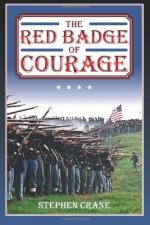|
|
The Red Badge of Courage Chapter 1
The novel opens with an image of an army of the American Civil War camping on the banks of a river, and the gleam of its campfires at night. A Tall Soldier (Jim Conklin) walks to the river to wash his shirt and races back to his friends in the camp with a rumor about troop movements. He relates the story to his comrades, saying assuredly that they will be moving the next day, and sets off a flurry of debate, most notably from a man described as the Loud Soldier (Wilson). The Tall Soldier and the Loud Soldier come close to fighting over their contentions.
Topic Tracking: Peer Pressure/Morale 1
A Youthful Soldier (Henry Fleming) listens to their debate carefully, then goes to his hut and lies down to be alone with his thoughts on the subject of the movement and the possibility of battle.
"He had, of course, dreamed of battles all his life - of vague and bloody conflicts that had thrilled him with their sweep and fire. In visions he had seen himself in many struggles. He had imagined peoples secure in the shadow of his eagle-eyed prowess. But awake he had regarded battles as crimson blotches on the pages of the past. He had put them as things of the bygone with his thought-images of heavy crowns and high castles. There was a portion of the world's history which he had regarded as the time of wars, but it, he thought, had been long gone over the horizon and had disappeared forever." Chapter 1, pg. 5
The youth sees the current Civil War in America as a play affair, far removed from his notion of idealized Greek struggles. Men were different than they had been, either "better, or more timid." He had wished to enlist several times, but his mother had tried hard to stop him, finding reasons for him to stay on the farm instead of chasing dreams of glory. Finally he had given in to the propaganda of the newspapers and gossip and had enlisted over his mother's misgivings. He was disappointed when her sendoff had not lived up to his Homeric expectations; she lectured him to be careful and when she cried as he left, he felt ashamed of his purposes. When he went to the seminary to say goodbye to his schoolmates, he had been the object of admiration; he had caught the eye of a dark-haired girl there who had been impressed with his dark blue uniform, and ever since then he had thought of her often. Afterward, he was sent to Washington and had been the subject of flattering approval and good treatment. Since then, he had endured many monotonous months in camp. He began to see his purpose as little more than a tiny piece in a vast demonstration of governmental posturing.
Topic Tracking: Fear of Battle 1
He had seen the enemy once - on guard duty one night, he talked to a picket on the other side of the river and had an amiable conversation. The veterans told tales of the enemy, portraying either grizzled men of great valor or starving hordes that would kill for food. The youth kept in mind that this was all hearsay, and as a new recruit, he was a target.
In the hut, the youth began to mull over the question of whether or not he would run from battle when the time came. He acknowledged the possibility that he might run, and it bothered him greatly. He worried that he had no precedent on which to know the answer to this question; he was starting with nothing when it came to battle.
The Tall Soldier and the Loud Soldier came into the hut, and the youth asked the Tall Soldier, Jim Conklin, for confirmation on the battle rumors. Jim assured him that it would happen. Pressing, the youth asked Jim how he thought the regiment would fight, and whether anyone would run. Jim answered that they would fight all right, adding that in every regiment there would be a few who would run. The youth asked him if he ever thought that he himself would run. Jim answered that he might, that if everyone ran he would follow, but if everyone stayed to fight he would stay, too. The youth felt some reassurance at this, for he had assumed all of the other men untried in battle possessed a confidence that he somehow did not.




